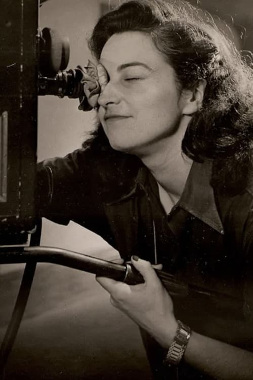Jacqueline Audry
French film director (1908–1977) From Wikipedia, the free encyclopedia
Jacqueline Audry (25 September 1908 – 22 June 1977) was a French film director who began making films in post-World War II France and specialised in literary adaptations.[1] She was the first commercially successful female director of post-war France.[2]
Jacqueline Audry | |
|---|---|
 | |
| Born | 25 September 1908 Orange, Vaucluse, France |
| Died | 22 June 1977 (aged 68) |
| Occupation | Film director |
| Years active | 1946–1973 |
| Spouse | Pierre Laroche |
Biography
Summarize
Perspective
Audry was born in Orange, Vaucluse, France.[3] Because there were few opportunities for female directors during the Nazi occupation,[4] Audry worked as an assistant to directors Jean Delannoy, G. W. Pabst and Max Ophüls and directed a short film of her own, Le Feu de paille (1943), with the help of the Centre Artistique et Technique des Jeunes du Cinéma (now La Femis).[4][5] The end of World War II and the liberation of France provided increased opportunities for women, but they still faced prejudice in the film industry.[4]
Audry's first feature film was Les Malheurs de Sophie (1946). This was based on the popular novel of the same name by the Comtesse de Ségur.[4] No copies of this film, which was censored for its "politically inappropriate" riot scenes, exist.[4] Unable to raise funds for her next film, she had to wait a couple of years before making Sombre dimanche[4] (1948). In the 1940s and 1950s, she directed three films based on Colette novels; Gigi (1949), Minne (1950) and Mitsou (1956), all three with actress Danièle Delorme. Mitsou, which featured sex outside of marriage, was heavily censored.[5]
Audry directed The Pit of Loneliness (Olivia, 1951), based on Dorothy Bussy's 1950 semi-autobiographical novel, Olivia.[4] Set in an all-girls boarding school, The Pit of Loneliness depicts a lesbian love story between a schoolgirl and her headmistress.[6] At the time, the film was very controversial and was censored in the United States and the United Kingdom.[6] Edwige Feuillère was nominated for a BAFTA award for Best Foreign Actress for her part as Mlle. Julie, the headmistress.[7] The film has been called a "landmark of lesbian representation".[8] She frequently collaborated with her sister, the novelist and screenwriter Colette Audry.[9]
Audry's film style was traditional and at odds with the French New Wave.[5] Her films had a feminist slant however.[5] Many of them had central female characters and they often gave a radical view of gender roles and female sexuality.[2][5][10] Audry retired from feature films after Bitter Fruit (1967), but she co-directed with Wojciech Solarz a Polish-French miniseries of the life of Honoré de Balzac in 1973. Audry died in a road accident in Poissy, Yvelines, France in 1977.[9]
She was married to the screenwriter Pierre Laroche with whom she collaborated on film scripts on a number of occasions.
Filmography
Among the 16 films Audry directed were:[3]
- The Misfortunes of Sophie (1946)
- Dark Sunday (1948)
- Gigi (1949)
- Minne (1950)
- Olivia (US title: The Pit of Loneliness) (1951)
- The Blonde Gypsy (1953)
- Huis clos (No Exit) (1954)
- Mitsou (1956)
- It's All Adam's Fault (1958)
- School for Coquettes (1958)
- Le Secret du chevalier d'Éon (1959)
- Girl on the Road (1962)
- Bitter Fruit (1967)
See also
References
External links
Wikiwand - on
Seamless Wikipedia browsing. On steroids.
